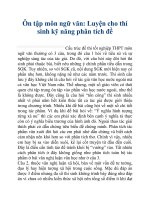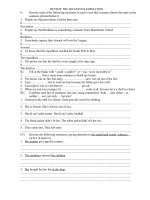- Trang chủ >>
- Lịch sử >>
- Lịch sử lớp 12
Bài ôn tập môn Anh văn - Tuần 5
Bạn đang xem bản rút gọn của tài liệu. Xem và tải ngay bản đầy đủ của tài liệu tại đây (84.49 KB, 3 trang )
<span class='text_page_counter'>(1)</span><div class='page_container' data-page=1>
<b>GRADE 9 - UNIT 3</b>
<b>I. VOCABULARY</b>
1. They often go to that _____ to pray. (market / hotel / hostel / shrine)
2. We have some _____ students for the program. (exchange / exchanged / to exchange / exchanging)
3. Are you a stamp _____? (collecting / collector / collect / collection)
4. Cattle and sheep are grazing in the _____. (bridges / rivers / fields / meadows)
5. Getting to the village is a very _____ journey. (interesting / interested / interest / interests)
6. The weather is nice. Shall we _____ mountains this morning? (go / travel / come / climb)
7. My village lies near the _____ of the mountain and by the river. (foot / leg / feet / legs)
8. He is considered one of the greatest _____ of the country. (heroes / heroin / heroines / heroic)
9. What do you think about his _____ of coins? (collect / collector / collection / collective)
10. There is a small bamboo _____ at the entrance to the village. (forest / forestation / forest ranger /
forestry)
11. We will go _____ a picnic next week. (in / at / on / to)
12. My village is about 100 kilometers _____ the south of HCMC. (in / at / to / for)
13. They often go for a walk in the park early in the morning to enjoy the ______ air there.
(salty / fresh / strong / windy)
14. We often go for a walk _____ the weekends. (in / for / on / to)
15. They will come here _____ 11:30 AM. (in / at / on / to)
16. She took many pictures to show the trip _____ her parents. (of / for / to / with)
17. There is a meeting _____ 9 AM and 2 PM. (on / between / till / at)
18. We was born _____ 15th<sub>, January. (in / of / at / on)</sub>
19. We have lived in Hanoi _____ 4 years. (in / since / for / at)
20. She has come here _____ yesterday. (in / since / for / on)
21. Many people go to amusement parks on weekends to ______ after a hard working week.
(enjoy / see / watch / relax)
22. _____ does it take to get there. (How / How long / How often / How soon)
23. I haven’t heard any news of Peter _____ 1999. (in / since / on / before)
24. Mr. Long does farming work while Mrs. Long works at a grocery store in a ______ town.
(nearside / near / nearly / nearby)
25. Not many people think that country life is _____. (bore / boring / bore / boringly)
26. After two hours traveling by bus, they _____ a quiet town by the beach. (arrived / got / went / reached)
27. Will you join us on a _____ trip to Vung Tau? (two days / two-days / two-day / day-two)
28. The Parkers have just gone out _____ hamburgers. (to / for / which / since)
29. After school she works _____ in a supermarket in the afternoon. (full-time / full / part-time /
time-part)
30. He can help his parents to _____ eggs. (feed / lay / collect / exchange)
<b>II. WORD FORM</b>
1. Getting to the village is a very _______________ journey. (interest)
2. Visitors can catch sight of an old banyan tree at the _______________ of the village. (enter)
3. Dalat is a (hill) _______________ city.
4. We really had an (enjoy) _______________ day on the beach.
5. Their holiday was spent (enjoy) _______________ on the mountain.
6. That little girl can dance (beauty) _______________.
7. Since her (arrive) _______________ the room has been full of laughter.
8. Most modern buildings has underground (park) _______________ lots.
9. I went to the (grocer) _______________ store to buy something.
10. There is no water left in the (near) _______________ well.
11. He is now studying in the USA as an (change) _______________ student.
12. They have a good (collect) _______________ of stamps.
13. Japan is said to be a (mountain) _______________ country.
14. Finding that the film was (interest) _______________, we turned off the TV.
15. The (grow) _______________ of trees occurs very slowly.
16. Most students go (picnic) _______________ when they have one Saturday off.
17. Some package trips to Thailand are (surprise) _______________ cheap.
</div>
<span class='text_page_counter'>(2)</span><div class='page_container' data-page=2>
<b>I. Combine each of the following pairs of sentences into one sentence, using </b><i><b>(not) adjective + enough + </b></i>
<i><b>to-infinitive</b></i>.
1. He wasn’t very experienced .He couldn’t do the job.
………
2. The ladder isn’t very long .It didn’t reach the window.
………
3. The fire isn’t strong .It won’t boil the kettle.
………
4. He is strong .He can carry that suitcase.
………
5. Minh is tall .He becomes a good basketball player.
………
<b>II. Combine each of the following pairs of sentences into one sentence, using (not) adjective + enough for</b>
<i><b>someone+ to-infinitive</b></i>.
1. The weather wasn’t very warm .We couldn’t go swimming.
………
2. The radio isn’t small. You can’t put it in your pocket.
………
3. It wasn’t very warm .We couldn’t sit in the garden.
………
4. The ladder wasn’t very long .I didn’t reach the window.
………
5. The ice is quite thick .We can walk on it.
………
<b>III. Combine each sentences into a new one, using “enough + noun + to.V”.</b>
1. We have money. We can buy that motorcycle.
………
2. She has a lot of free time. She can go to the movies with you.
………
3. Mr Brown has experience. He can solve this problem.
………
4. She doesn’t know much knowledge, she can’t answer the question.
………
5. I haven’t got money. I can’t go away on holiday.
………
<b>IV. Combine each sentences into a new one, using “too + adj + to.V”:</b>
1. The children were very late. They couldn’t see the display of fireworks.
………
2. Your brother is very young. He can’t go swimming.
………
3. He was very old. He couldn’t ride the bumper car.
………
4. The tooth is very decayed. It can’t be kept.
………
5. I am very anxious. I can’t wait for you any longer.
………
<b>V. Combine each sentences into a new one, using “too + adj + for + pro/noun + to.V”:</b>
1. The sound is very low. We can’t hear it.
………
2. This book is very difficult. I can’t read it.
………
3. This table is very heavy. He couldn’t move it.
………
4. The story is very long. You cannot read it in an hour.
………
5. The suitcases were small. Peter couldn’t put all his clothes in them.
</div>
<span class='text_page_counter'>(3)</span><div class='page_container' data-page=3>
<b>VI. Conmbine these pairs of sentences using “so…that” :</b>
1/ I’m very tired. I couldn’t keep my eyes open.
………
2/ This coat is very big. I can’t wear it.
………
3/ The coffee was so strong. She couldn’t go to sleep.
………
4/ That bag was very heavy. None of us could carry it.
………
5/ The stadium is very large. It can hold 60,000 people.
………
<b>VII. Combine these pairs of sentences using “such….that” :</b>
1/ Mary is a good swimmer. She has won two gold medals.
………
2/ He drank strong coffee. He couldn’t go to sleep.
………
3/ It was a long walk. The children got tired.
………
4/ He told interesting stories. They all like him.
………
5/ The boy made rapid progress. It surprised everybody.
………
<b>VIII. Rewrite sentences with the word given keep meaning as the root one.</b>
1) The weather is so bad that we can’t go out.
=> The weather is too……..
2) The film was so boring that we couldn’t go on seeing it.
=> The film was too…..
3) He was so old that he couldn’t run fast.
=> ) He was too…..
4) He spoke so fast that we couldn’t understand him.
=> He spoke too…..
5) The fair was so noisy that we couldn’t hear each other.
=> The fair was too….
<b>IX. WISH CLAUSE</b>
1. What a pity! Susan doesn’t help her mother.
We wish...
2. It’s a pity! Marie isn’t here.
I wish ...
3. She spends a lot of money on clothes.
Her mother wishes ...
4. Quang is careless.
The teaches wishes...
5. What a pity! The weather isn’t nice.
We wish ...
6. I’m sorry that I don’t finish my homework.
I wish ...
7. It’s a pity! I don’t know her address.
I wish I ...
8. There aren’t any flowers in my garden.
I wish ...
9. What a pity! You don’t have a dictionary.
We wish ...
10. The students forget to turn off the faucet after use.
</div>
<!--links-->









